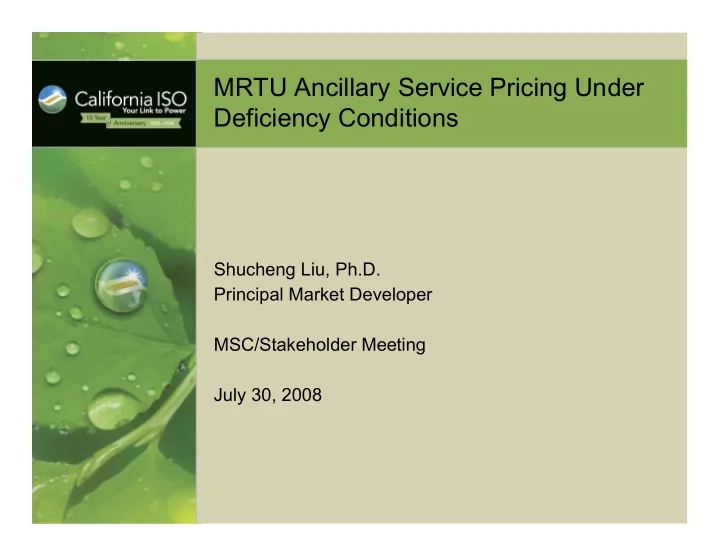

MRTU Ancillary Service Pricing Under Deficiency Conditions Shucheng Liu, Ph.D. Principal Market Developer MSC/Stakeholder Meeting July 30, 2008
Guideline for MRTU A/S Pricing Under Deficiency Conditions There is no ancillary service (A/S) Scarcity Pricing in MRTU FERC accepted in concept the CAISO’s initial limited scarcity proposal FERC directed the CAISO to implement a more extensive Scarcity Pricing mechanism within 12 months after the startup of MRTU California ISO Public Slide 2
MRTU A/S Pricing Under Deficiency Conditions In case of insufficient supply, minimum A/S requirement will be reduced. Supply deficiency is identified in Scheduling Run A/S requirement is reduced in Pricing Run to eliminate supply deficiency Marginal economic A/S bid always sets A/S market clearing price (ASMP) with opportunity cost of providing energy California ISO Public Slide 3
Additional MRTU A/S Pricing Rules A/S pricing under deficiency conditions also follows the following rules Not to procure lower quality A/S to meet the requirement for a deficient higher quality A/S To procure more the same or higher quality A/S from the outer Region to meet the requirement of an A/S deficient in a nested Sub-Region California ISO Public Slide 4
General Assumptions of Examples Two nested regions 1 Region 2 – a Sub-Region within the CAISO system 2 Region 1 – the CAISO system excluding Region 2 Energy and one A/S product With fixed energy demand and minimum A/S requirement in each region Supply constraints for each of the four suppliers Maximum bid-in A/S capacity Maximum total bid-in capacity California ISO Public Slide 5
Example 1 – No A/S Supply Deficiency There is no A/S supply deficiency Input Assumptions California ISO Public Slide 6
Example 1 – Scheduling Run Co-optimization Model California ISO Public Slide 7
Example 1 – Results of Scheduling Run and Pricing Run Scheduling Run Results Since there is no supply deficiency, energy prices are set by marginal economic bids. ASMPs include marginal A/S bids and opportunity costs Pricing Run has the same results California ISO Public Slide 8
Example 2 – A/S Supply Deficiency in Region 2 Based on Example 1, Supplier 3’s bid-in A/S capacity is reduced to create a deficiency in Region 2 Input Assumptions California ISO Public Slide 9
Example 2 – Scheduling Run Results Scheduling Run Results There is a 5 MW A/S supply deficiency in Region 2 A/S minimum requirement of Region 2 will be reduced by 5 MW in Pricing Run California ISO Public Slide 10
Example 2 – Pricing Run Co-optimization Model California ISO Public Slide 11
Example 2 – Pricing Run Results Pricing Run Results There is no more A/S supply deficiency in Pricing Run The ISO procures 5 MW more A/S in Region 1 to meet the total A/S requirement of Region 1 & 2 Energy dispatch and A/S procurements are different than Example 1 (shown in red), but ASMPs are the same. California ISO Public Slide 12
Example 3 – A/S Supply Deficiency in both Region 1 & 2 Based on Example 2, Supplier 1’s bid-in A/S capacity is reduced to create deficiencies in both Region 1 & 2 Input Assumptions California ISO Public Slide 13
Example 3 – Scheduling Run Results Scheduling Run Results There is a 5 MW A/S supply deficiency in Region 2 and a 2 MW deficiency in the total of Region 1 & 2 A/S minimum requirement of Region 2 and the total of Region 1 & 2 will be reduced in Pricing Run California ISO Public Slide 14
Example 3 – Pricing Run Co-optimization Model California ISO Public Slide 15
Example 3 – Pricing Run Results Pricing Run Results There is no more A/S supply deficiency in Pricing Run Energy dispatch and A/S procurements are different than Example 1 (shown in red), but ASMPs are the same. California ISO Public Slide 16
Summary – No A/S Scarcity Pricing in MRTU A/S supply deficiency is eliminated in Pricing Run by reducing A/S requirement Example 1 – no A/S supply deficiency Example 2 – A/S requirement in Region 2 is reduced Example 3 – A/S requirements in Region 2 and the total of Region 1 &2 are reduced MRTU A/S pricing mechanism follows the guideline: No A/S Scarcity Pricing in MRTU Marginal economic A/S bid always sets ASMP with opportunity cost of providing energy California ISO Public Slide 17
Questions California ISO Public Slide 18
Recommend
More recommend